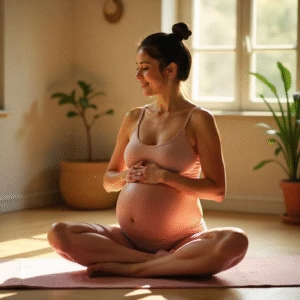The Profound Benefits of Yoga During Pregnancy: A Holistic Guide for Expectant Mothers
Pregnancy is a transformative journey, both physically and emotionally. As expectant mothers navigate this significant life stage, maintaining physical health and mental well-being becomes paramount. Yoga, with its holistic approach, has emerged as an ideal practice for pregnant women, offering a multitude of benefits that support a healthy pregnancy and prepare the body for childbirth. Here, we delve into the numerous advantages of incorporating yoga during pregnancy into a prenatal routine, emphasising its role in fostering a serene and strong journey to motherhood.

Embracing a Healthy Pregnancy: The Role of Yoga
The nine months of pregnancy are a period of immense change. From hormonal shifts to physical adjustments, the body undergoes a remarkable transformation. While traditional exercise is often recommended, yoga during pregnancy stands out due to its gentle yet effective nature, combining physical postures, breathing exercises, and meditation. This integrated approach not only addresses common pregnancy discomforts but also cultivates a deeper connection between the mother and her developing baby.
Enhanced Physical Health: Strengthening the Body for Motherhood
Yoga during pregnancy helps in maintaining overall physical health, addressing common discomforts, and preparing the body for labor. Key physical benefits include:
-
Improved Flexibility and Strength: Prenatal yoga poses gently stretch and strengthen muscles, particularly those in the pelvic floor, hips, and abdomen, which are crucial during childbirth. Regular practice can help to open the hips, increase pelvic mobility, and strengthen the core muscles that support the growing uterus, thereby reducing strain on the back and improving posture.
-
Alleviated Aches and Pains: Many pregnant women experience back pain, sciatica, swelling in the ankles and feet, and other physical discomforts. Yoga postures, such as Cat-Cow stretch, Child’s Pose, and modified warrior poses, can alleviate these issues by promoting proper alignment, releasing tension in tight muscles, and improving circulation. This targeted relief contributes significantly to an expectant mother’s comfort.
-
Enhanced Circulation: Yoga improves blood flow throughout the body, reducing swelling (edema) common in the latter stages of pregnancy and increasing oxygen supply to both mother and baby. Improved circulation also aids in better nutrient delivery and waste removal, contributing to the overall health of both. Poses that elevate the legs or gently invert the body, alongside mindful breathing, are particularly effective.
-
Better Balance and Stability: As the body’s center of gravity shifts during pregnancy, maintaining balance can become challenging. Yoga during pregnancy focuses on poses that build core strength and improve proprioception (the body’s awareness in space), reducing the risk of falls and promoting a sense of stability.
Emotional and Mental Well-being: A Sanctuary for the Mind
Pregnancy often brings a whirlwind of emotions, from excitement and joy to anxiety and apprehension. Yoga offers a sanctuary for mental peace and emotional stability through:
-
Stress Reduction: The combination of deep breathing exercises (pranayama) and mindful movement in yoga reduces cortisol levels, the primary stress hormone, mitigating stress and anxiety. Practices like alternate nostril breathing (Nadi Shodhana) or simply focusing on the breath can calm the nervous system and promote a sense of tranquility. This is especially vital as studies show chronic stress can impact pregnancy outcomes.
-
Mindfulness and Relaxation: Yoga encourages mindfulness, helping expectant mothers to connect with their changing bodies and developing babies. This practice fosters a sense of calm and relaxation, allowing mothers to embrace the present moment and savor the unique experience of pregnancy. Techniques like body scans and guided meditations are powerful tools for achieving this connection.
-
Improved Sleep: Many pregnant women struggle with sleep disturbances due to physical discomforts, hormonal changes, or anxiety. Yoga’s relaxation techniques, gentle stretches, and emphasis on calming the mind can significantly enhance sleep quality, ensuring that both mother and baby get the rest they need for healthy development and recovery. Creating a calming evening yoga routine can be particularly beneficial.
-
Preparation for Motherhood: Beyond physical preparation, yoga during pregnancy provides a mental framework for the journey ahead. It encourages self-compassion, patience, and acceptance – qualities that are invaluable for navigating the challenges and joys of motherhood.

Preparing for Labor and Delivery: Equipping the Body and Mind
Yoga during pregnancy equips women with tools and techniques that are invaluable during labor and delivery:
-
Breath Control (Pranayama): Pranayama, or yogic breathing techniques, teach expectant mothers how to manage their breath effectively. This skill is crucial during labor, helping to maintain focus, manage pain, and ensure adequate oxygen supply to the baby. Specific breathing patterns, such as Ujjayi breath (victorious breath), can be practiced to regulate the nervous system and provide a point of focus during contractions.
-
Increased Stamina and Endurance: Labor is often described as a marathon, requiring significant physical endurance. Yoga builds physical stamina through sustained postures and mindful movement, which is beneficial for the demands of labor. Strengthening the legs, core, and back muscles prepares the body for the exertion required.
-
Pain Management Techniques: The mental discipline cultivated through yoga, particularly through mindfulness and breath awareness, can aid in coping with labor pain. Visualization, relaxation techniques, and body awareness learned in yoga can be applied during contractions to help manage discomfort and maintain a sense of control. Focusing on the breath rather than the pain can shift perception and enhance coping mechanisms.
-
Optimal Fetal Positioning: Certain yoga poses, especially those that involve gentle inversions or hip openers, can encourage the baby to move into an optimal position for birth, potentially leading to a smoother and less complicated delivery. Consulting with a certified prenatal yoga instructor can help identify these beneficial poses.
Postpartum Recovery: The Continuing Benefits of Prenatal Yoga
The benefits of yoga during pregnancy extend beyond pregnancy, aiding in postpartum recovery:
-
Faster Physical Recovery: The physical strength, flexibility, and core stability developed through yoga can lead to a quicker postpartum recovery. Strengthened pelvic floor muscles, for example, are essential for regaining bladder control and supporting internal organs after childbirth.
-
Mental Resilience: The emotional resilience and coping mechanisms built during prenatal yoga can help new mothers navigate the challenges of early motherhood, including sleep deprivation, hormonal fluctuations, and the demands of caring for a newborn. The practice offers a familiar sanctuary for self-care and mental rejuvenation.
-
Bonding with Baby: While yoga primarily focuses on the mother, the mindful connection cultivated during pregnancy often extends postpartum. Some mothers find gentle post-natal yoga with their babies to be a wonderful way to continue bonding and to re-engage with their bodies in a gentle, supportive way.

Community and Support: Finding Your Tribe
Joining a prenatal yoga class offers more than just physical and mental benefits; it also creates a sense of community:
-
Shared Experience: Connecting with other pregnant women who are navigating similar experiences can provide invaluable emotional support, a sense of camaraderie, and a platform for sharing advice and concerns. This community can be a vital source of encouragement and understanding.
-
Expert Guidance: Certified prenatal yoga instructors are specially trained to understand the unique needs and limitations of pregnant bodies. They can offer personalized advice, modify poses to ensure the safety and effectiveness of the practice, and provide guidance on proper alignment and breathing techniques tailored for pregnancy. Dr. Renu Yadav emphasizes the importance of supervised and safe exercise during pregnancy. For more insights into women’s health during and after pregnancy, explore the services and expertise available at Dr. Renu Yadav’s official website.
-
Safe and Supportive Environment: A dedicated prenatal yoga class offers a safe and non-judgmental space where expectant mothers can move freely, connect with their bodies, and prepare for childbirth without pressure. It’s an environment designed to nurture and empower.
Beyond the Mat: Integrating Wellness into Your Pregnancy
While structured yoga classes are highly beneficial, integrating the principles of yoga during pregnancy into daily life can further enhance well-being. This might include:
-
Mindful Walking: Paying attention to your breath and body while walking can be a form of moving meditation.
-
Short Breathing Exercises: Even a few minutes of deep belly breathing can calm the nervous system.
-
Gentle Stretching: Incorporating simple stretches throughout the day to alleviate tension.
It’s crucial to listen to your body and adapt your practice as your pregnancy progresses. What feels comfortable in the first trimester may need modification in the third. Always prioritise rest and gentle movement. For comprehensive care and personalised advice on maintaining your health through all stages of pregnancy, contact Dr. Renu Yadav.
Conclusion: A Harmonious Journey with Yoga
Incorporating yoga during pregnancy into a prenatal routine can profoundly impact an expectant mother’s journey, providing physical strength, mental clarity, and emotional balance. By embracing the practice of yoga, pregnant women can enhance their overall well-being, prepare for a smoother labor, and foster a strong foundation for postpartum recovery. The holistic advantages of yoga make it an invaluable tool for a healthy and joyful pregnancy experience. As always, it is essential to consult with a healthcare provider, such as Dr. Renu Yadav, before beginning any new exercise regimen during pregnancy to ensure it is appropriate for your individual health needs.



